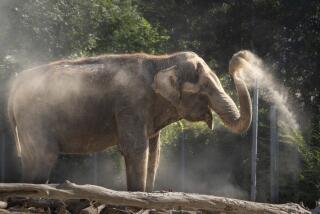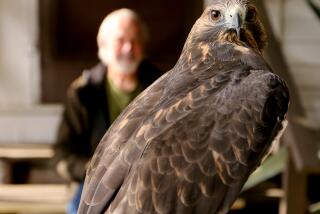USDA Calls Dunda Discipline Excessive in Letter of Warning
- Share via
The discipline applied by San Diego Wild Animal Park keepers to Dunda the elephant in February, 1988, exceeded acceptable measures under federal regulations concerning the handling of animals, the U.S. Department of Agriculture concludes in a letter of warning to the Zoological Society of San Diego.
The April 6 letter said that results of an investigation by the department’s Animal and Plant Health Inspection Service (APHIS) show “repeated disciplinary measures” on Feb. 17 and 18, 1988, to the 18-year-old female African elephant “did cause bruising and damage to the skin on the elephant’s head and signs of behavioral stress.”
James W. Glosser, the administrator of APHIS, reminded the Zoological Society of federal law regarding animal treatment. “Handling of animals shall be done as expeditiously and carefully in a way so as not to cause unnecessary discomfort, behavioral stress, or physical harm to the animal,” Glosser wrote. “Care should be exercised also to avoid harm to the handler.”
Glosser said that while zoos obviously require animal control and discipline to assure both the safety of animals and the public, “We must warn you that any further documented use of such excessive disciplinary measures (as occurred with Dunda) may result in legal action to secure compliance” with federal laws.
Zoological Society spokesman Jeff Jouett said Monday that its officials disagree with the letter’s conclusion.
“We stand by our own investigation and the investigations by the San Diego Humane Society, the San Diego city attorney, and the American Assn. of Zoological Parks and Aquariums, which found that Dunda’s short disciplinary training sessions were not excessive and did not cause unnecessary discomfort,” Jouett said.
Jouett said that USDA inspectors lack expertise in handling exotic, or zoo animals, because their usual experience has been in dealing with domesticated animals.
“We are willing to work closely with the USDA to develop elephant-training guidelines that are beneficial for elephants, and to allow their keepers to work safely,” Jouett said.
Sessions Criticized as Brutal
Zoo officials maintain that the discipline, which included chaining Dunda’s legs, pulling her to the ground, and beating her on the head with ax handles for short periods, was necessary to train Dunda not to lash out and try to injure her keepers. The incident occurred shortly after Dunda was transferred to the Wild Animal Park from the San Diego Zoo, where she had spent most of her life.
Several of Dunda’s former keepers at the zoo criticized the sessions as unnecessary and brutal, but the numerous subsequent investigations produced conflicting conclusions. While the San Diego Humane Society and city attorney’s office concluded that there was insufficient evidence to prosecute anyone on animal cruelty charges, the Humane Society of the United States called the incident a clear case of abuse.
The incident raised questions of how elephant discipline is handled at zoos around the world and whether changes need to be considered.
Sen. Dan McCorquodale (D-San Jose), who took an active interest in the case and has introduced legislation to ban zoo elephant rides and limit types of discipline, said Monday he was pleased at the USDA letter.
“The people who are on the outside and unrelated to the city and zoo have said there was excessive force used, and those that have close ties (to the zoo) have tried to smooth the issue over, so I’m satisfied with what the (USDA) did and it did give a good strong warning and said clearly it will be watching things in the future,” McCorquodale said.
Prohibitions Under Legislation
His legislation, on which a public hearing will be held in the state Senate later this month, would prohibit elephant discipline that involved use of electricity, deprivation of food, water or rest, or any action that results in damages, scars or breaks in the skin. It would also prohibit insertion of any instrument into an animal’s bodily orifices.
“Hopefully, the zoo will look back on this in hindsight and say that what was done was not a good thing and go on and try to rebuild its image as it existed in the past,” McCorquodale said.
Jouett said that the zoo, while it disagrees with the USDA and will so respond, “is onto other things” as well.
“There are two elephants now pregnant, three others are suspected of being pregnant, and we expect an elephant birth in August,” Jouett said. Dunda is not yet ready for a mate, however, because she needs more time to be fully accepted into the Wild Animal Park herd, he said.
More to Read
Sign up for Essential California
The most important California stories and recommendations in your inbox every morning.
You may occasionally receive promotional content from the Los Angeles Times.













